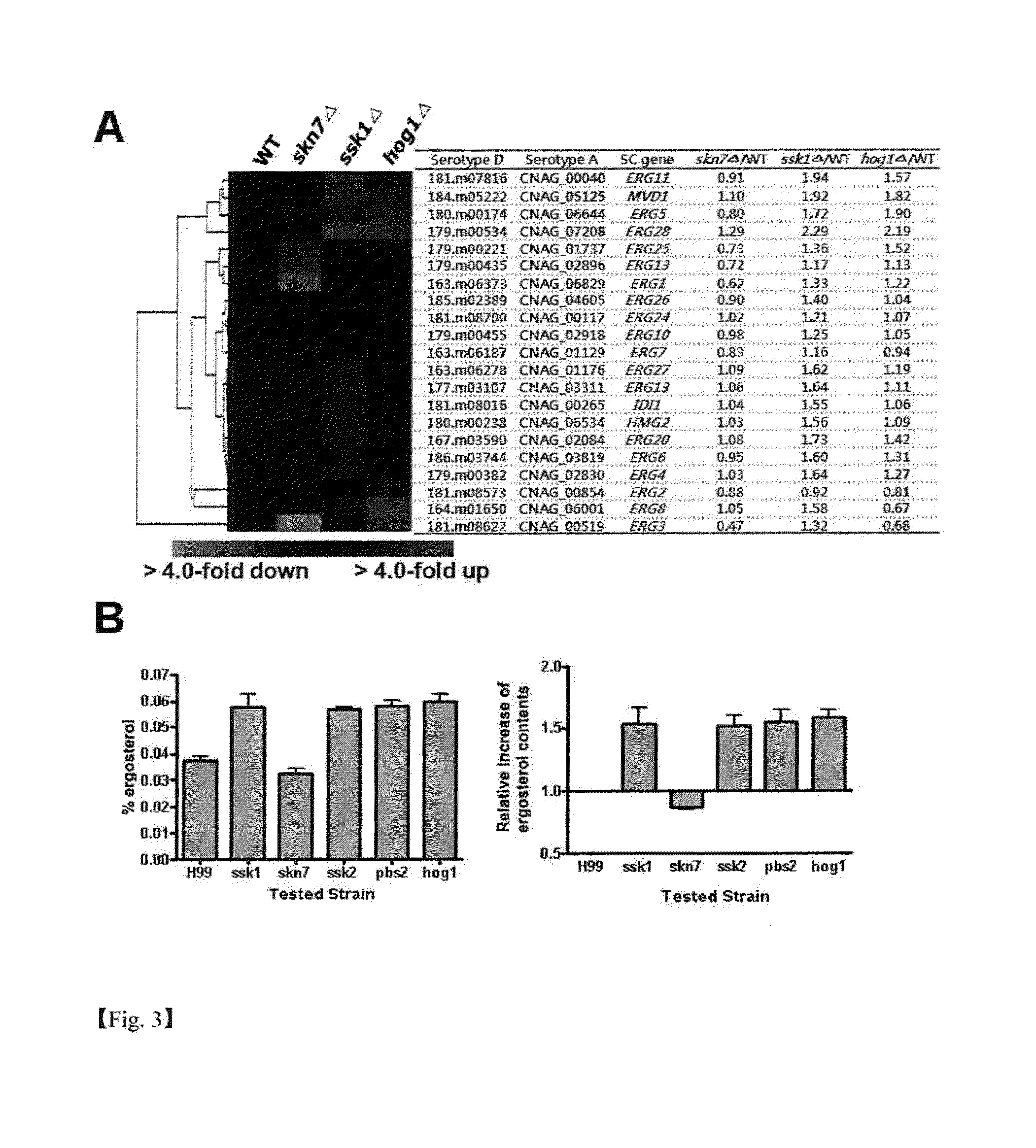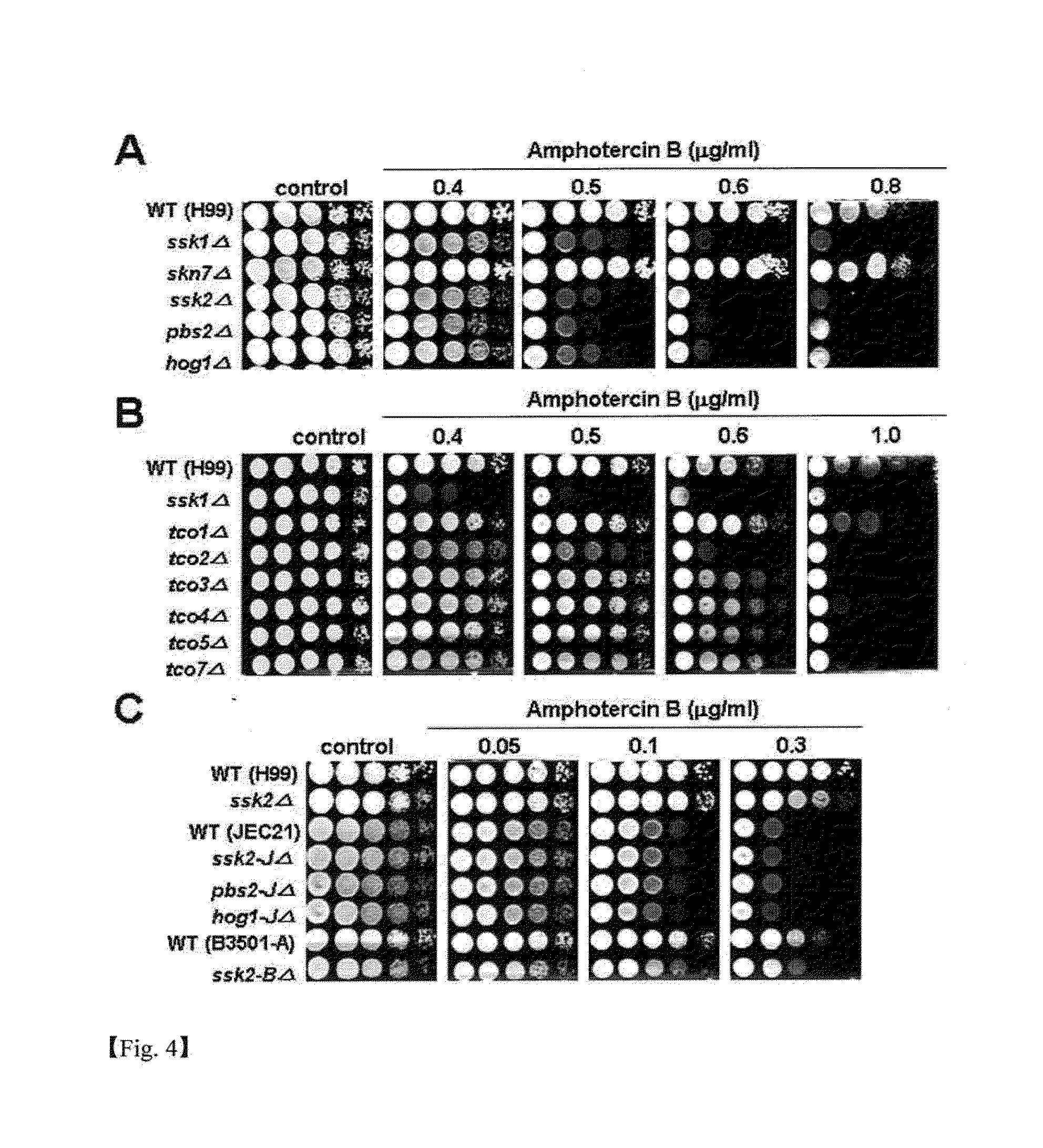USE OF THE GENES IN THE HOG, Ras AND cAMP PATHWAY FOR TREATMENT OF FUNGAL INFECTION
a technology of hog and signal transduction pathway, which is applied in the direction of peptides, biological material analysis, dna/rna fragmentation, etc., can solve the problems of low production of erithropoietins, increased rate of permanent loss of renal function, and increased ergosterol biosynthesis level, and improved sensitivity to polyene- or azole-based drugs, etc.
- Summary
- Abstract
- Description
- Claims
- Application Information
AI Technical Summary
Benefits of technology
Problems solved by technology
Method used
Image
Examples
example 1
DNA Microarray Analysis of C. neoformans hog1Δ, ssk1Δ, and skn7Δ Mutants
[0102]To investigate Hog1 signaling pathway in C. neoformans, we performed comparative transcriptome analysis of serotype A wild-type (WT, H99) strain, hog1Δ, ssk1Δ, and skn7Δ mutants under both normal growth conditions and stressed conditions, such as in the presence of osmotic shock (1 M NaCl), oxidative stress (2.5 mM H2O2), and antifungal drug fludioxonil (40 μg / ml), by using DNA microarray analysis. We isolated total RNAs from cells growing in each stress condition after zero (non-stress condition), 30, and 60 min incubation. We prepared 3 independent RNA samples for each condition as biological replicates for DNA microarray analysis. As a control RNA for common Cy3 labeling, we used reference RNAs that were pooled from all RNA samples prepared in this study. We used 70-mer serotype D C. neoformans DNA microarray chips containing total 7,936 spots, based on information from the C. neoformans genome database...
example 2
Ergosterol Biosynthesis Genes are Transcriptionally Upregulated by Perturbation of the HOG Signaling Pathway
[0111]Among genes upregulated by mutation of HOG1 and SSK1 genes, a gene homologous to ERG28 (CNAG—07208) was noticeable since it plays a key role in the fungal sterol biosynthesis. Previous microarray analysis performed in S. cerevisiae revealed that expression of ERG28 is tightly correlated with other ergosterol biosynthetic genes. Erg28 is an endoplasmic reticulum (ER) transmembrane scaffold, protein, which is essential for the yeast sterol biosynthesis by interacting strongly with Erg27, Erg25, Erg11, and Erg6 and weakly with Erg26 and Erg1. This finding led us to monitor expression patterns of other sterol biosynthetic genes in our array data.
[0112]FIG. 2A shows the relative expression profiles of ergosterol biosynthesis genes in hog1Δ, ssk1Δ, and skn7Δ mutants compared to WT strain. The fold change is illustrated by a color (see color bar scale) and exact value for each ...
example 3
Finding and Characterizing the Downstream Target Genes Controlled by the HOG Pathway
[0123]We found ENA1 (serotype A ID: CNAG—00531.2) and NHA1 (serotype A ID: CNAG_01678.2) genes as the downstream target genes controlled by the HOG pathway and performed an additional experiment. Cells excrete H+(proton) out of cell membrane using H+-ATPase pump such as Pma1, thereby playing a role in maintaining membrane potential essential to cell growth in a normal condition. On the contrary, potassium ion(K+), an ion useful to cell growth, flows into cells using K+ influx pump such as Trk1 / Trk2. Na+, unlike K+, is classified as a toxic ion. When high concentration of Na+ is present in a cell, it should be excreted via efflux pump. Since K+ also has toxicity when it presents in high concentration, an efflux pump is needed. These are Ena1 and Nha1 which play a role as an efflux pump for Na+and K+.
[0124]The result showed that the two genes coding for the two efflux pumps are controlled by the HOG pa...
PUM
| Property | Measurement | Unit |
|---|---|---|
| OD | aaaaa | aaaaa |
| concentration | aaaaa | aaaaa |
| concentration | aaaaa | aaaaa |
Abstract
Description
Claims
Application Information
 Login to View More
Login to View More - R&D
- Intellectual Property
- Life Sciences
- Materials
- Tech Scout
- Unparalleled Data Quality
- Higher Quality Content
- 60% Fewer Hallucinations
Browse by: Latest US Patents, China's latest patents, Technical Efficacy Thesaurus, Application Domain, Technology Topic, Popular Technical Reports.
© 2025 PatSnap. All rights reserved.Legal|Privacy policy|Modern Slavery Act Transparency Statement|Sitemap|About US| Contact US: help@patsnap.com



